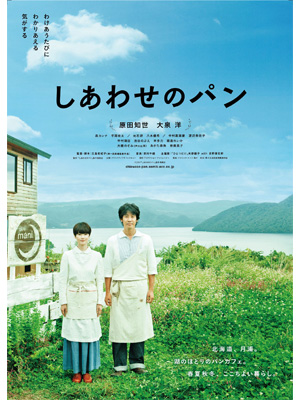I recently watched a Japanese film called Bread of Happiness and was deeply moved by how Japanese philosophies are woven into the story. The film follows the story of a young married couple Rie and Nao Mizushima. They moved from Tokyo to the rural and picturesque Lake Toya in Hokkaido Prefecture to start a café guest house called Mani. Through the various seasons of a year, they help their guests who come to stay with them. Each guest has their own difficulties, and Rie and Nao help them to see life from a new perspective.

Japanese philosophy: Shogyō Mujō (諸行無常)
The film embodies one of the key philosophies in Japanese thought called Shogyō Mujō (諸行無常). This translates to “everything is always changing” or “nothing stays the same forever.” Rooted in Buddhist philosophy, this concept teaches that life, nature, and all things in the world are transient and impermanent.
The term Shogyō Mujō can be broken down into two parts:
- Shogyō (諸行) meaning “all things”
- Mujō (無常) meaning “impermanence”
To better understand this idea, here are a few examples:
- Cherry blossoms (sakura) bloom in stunning beauty, yet their petals fall quickly, symbolizing the fleeting nature of life. This is often referred to as hakana-sa (儚さ), the “ephemeral nature” of cherry blossoms.
- The seasons change: spring turns to summer, summer shifts to autumn, each season giving way to the next.
- People, too, grow and evolve—we are not the same as we were yesterday.
Shogyō Mujō invites us to accept change as a natural part of existence and encourages us to appreciate the present moment, recognizing the beauty in life’s impermanence.
The café is run by a married couple: Rie, who cooks seasonal dishes and makes coffee, and Mizushima, who bakes bread. They don’t just serve food, bread, and coffee to their customers—they do so with unconditional love, making their customers feel happy and cherished. Their way of serving others can be understood through a Buddhist concept called Ichigo Ichie (一期一会), which means “treasure each moment as if it will never happen again.” This philosophy encourages mindfulness, reminding us to appreciate every encounter and experience as unique and precious.
The film beautifully highlights the four seasons—spring, summer, autumn, and winter—not only through the seasonal ingredients used in the café’s dishes but also through the lives of the customers who visit. Each customer’s stage of life seems to serve as a metaphor for the changing seasons.
This concept is deeply connected to Shogyō Mujō (諸行無常), the Buddhist philosophy that everything is impermanent—just as the seasons change, people also grow and evolve.
For example, a young man and woman in their 20s who meet at the café are in their “summer” phase of life. The woman, who is called Kaori, who lives and works in the busy and bustling Tokyo, is struggling to find meaning in her fast-paced life. Meanwhile, the young man Tokio, a local resident of Hokkaido, feels unsatisfied with his quiet life but lacks the courage to leave for Tokyo. Through their encounter, they come to understand that there is no “perfect” place—each choice comes with its own trade-offs, reflecting the Japanese phrase nai mono nedari (ないものねだり), which means “yearning for what one does not have.” Through the warm hospitality of the café owners, the young woman discovers that true happiness can be found in the simplicity of everyday life, and that she can find this even in a big city like Tokyo. Meanwhile, Tokio gains the courage to change his life and seek new opportunities.
Another customer at the café in autumn is a young girl who struggles to cope with her parents’ separation. She deeply misses her mother and the pumpkin soup her mother used to make. When served a similar soup at the café, she refuses to eat it, unable to accept the change.
Sensing their sadness, the café owners invite the girl and her father for dinner. During the meal, they realise that the café’s pumpkin soup is not the same as the one her mother used to make. This moment reflects the Japanese philosophy that everything will eventually change—whether it’s happiness, sadness, or difficult times, nothing lasts forever. This idea encourages people to cherish the present moment, knowing that all things are temporary.
The next customers are an elderly married couple who visit the café on a heavily snowing day. Having faced many challenges throughout their lives, they now struggle with the realities of ageing. The old man, feeling that their time is coming to an end, has quietly decided to finish their journey together at Lake Toya.
However, through the café owners’ warm hospitality, he has a change of heart. He realises that although they are growing older and there are fewer things they can do, life still holds opportunities for new beginnings. This reflects the Japanese philosophy of Wabi-Sabi (侘寂), which embraces imperfection, transience, and the beauty of ageing. Rather than resisting change, Wabi-Sabi teaches us to accept life as it is, finding peace and beauty in each stage. This episode reminds us to focus on the positive and appreciate life’s simple yet profound moments, no matter our age.
Lastly, the film also highlights a cultural concept in Japanese society called enryo (遠慮), which means holding back or showing restraint. It reflects a deep sense of consideration for others and involves:
- Thinking about how your actions might affect those around you.
- Choosing to act in a way that maintains harmony and avoids burdening others.
In Japan, harmony, or wa (和), is fundamental. To preserve this harmony, people tend to avoid being overly direct or assertive, especially if it might inconvenience or embarrass someone.
A young woman in her 20s, who visits the café in summer, struggles with expressing her true self. Instead, she tries to present herself as the person she wishes to be. In the workplace, people often force themselves to smile even when they don’t feel like it in order to maintain harmony. However, during her stay at the café, she begins to realise that she doesn’t have to smile if she doesn’t want to—embracing the idea that she can be herself without the pressure of conforming.
This film reflects Japanese philosophy and culture, offering a deep insight into Japanese society. I highly recommend watching it! The film is available for free on the JFF Theatre website until the 1st of May.
JFF Theatre can be found at https://en.jff.jpf.go.jp
Main image source (copyright of “Bread of Happiness Film Partners”): https://www.jff.jpf.go.jp/images/2024/12/DSC_08026-676e17c56acdf-scaled.jpg
Movie poster image source: https://news.livedoor.com/article/image_detail/5888940/?img_id=2193897


